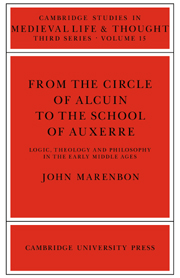 From the Circle of Alcuin to the School of Auxerre
From the Circle of Alcuin to the School of Auxerre Published online by Cambridge University Press: 24 October 2009
THE FORTUNE OF THE MUNICH PASSAGES
The fortune of the Munich Passages in the Middle Ages was of two markedly different kinds: for the dicta Albini and, to a much lesser extent, the dicta Candidi, a wide and various diffusion; for the other passages, a limited and specialized readership. This pattern emerges most clearly from the list of surviving manuscripts of the Passages which I have compiled (see below, pp. 149–51). In the following paragraphs, I will summarize the results of this survey.
To deal with the fortune of the Passages besides the two dicta first. Besides V, no Carolingian manuscript of the Munich Passages complete or nearly so survives, although an epistolary version of the dicta Candidi, written between 801 and 805, does append Passage I. Benedict of Aniane, who, like Candidus, helped Alcuin in opposing the adoptionist heresy, borrows a number of passages in his Munimenta fidei, where they stand side by side with material from Augustine's De Trinitate, one of their main sources. Two later manuscripts contain a substantial selection of the Passages. B, which dates from the second half of the ninth century, contains all the Passages except for the dicta Albini, x and xI: it is almost certainly a copy of a school-book from the milieu of Candidus himself. P is complete, except for the dicta Albini and Passage VI. The manuscript dates from the first half of the tenth century and was probably produced in the School of Auxerre.
To save this book to your Kindle, first ensure [email protected] is added to your Approved Personal Document E-mail List under your Personal Document Settings on the Manage Your Content and Devices page of your Amazon account. Then enter the ‘name’ part of your Kindle email address below. Find out more about saving to your Kindle.
Note you can select to save to either the @free.kindle.com or @kindle.com variations. ‘@free.kindle.com’ emails are free but can only be saved to your device when it is connected to wi-fi. ‘@kindle.com’ emails can be delivered even when you are not connected to wi-fi, but note that service fees apply.
Find out more about the Kindle Personal Document Service.
To save content items to your account, please confirm that you agree to abide by our usage policies. If this is the first time you use this feature, you will be asked to authorise Cambridge Core to connect with your account. Find out more about saving content to Dropbox.
To save content items to your account, please confirm that you agree to abide by our usage policies. If this is the first time you use this feature, you will be asked to authorise Cambridge Core to connect with your account. Find out more about saving content to Google Drive.